| Srl | Item |
| 1 |
ID:
188713
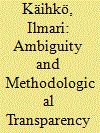

|
|
|
|
|
| Summary/Abstract |
Researchers who study civil wars and other armed conflicts are bound to face ambiguities. This article continues the discussion about research brokers in conflict zones that started in a 2019 special issue of Civil Wars and scrutinises the finding that Liberian wartime command structures continue to linger in informal guises long to the post-conflict. Absent transparent acknowledging of the ambiguities it glosses over, past scholarship risks a far too neat story that imbues arguments with untested assumptions. The result neither captures the complexity of contemporary realities of Liberian former combatants nor helps Liberia to move forward from its difficult past.
|
|
|
|
|
|
|
|
|
|
|
|
|
|
|
|
| 2 |
ID:
164637
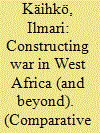

|
|
|
|
|
| Summary/Abstract |
This article investigates the variation of the conduct of war in three Mano River countries in West Africa – Côte d’Ivoire, Liberia and Sierra Leone. A theoretical framework that views war as an institution is provided to explain this variation. While an existing idea in social sciences, to date it has largely been used to understand historical case. This article extends its scope to encompass non-state actors and the modern era through an account of how war was constructed in the Mano River region. The idea of war as an institution highlights the value of cultural sociological investigations of war. As institutions structure action, the framework offered carries immediate consequences for strategic thought.
|
|
|
|
|
|
|
|
|
|
|
|
|
|
|
|
| 3 |
ID:
173124
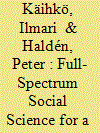

|
|
|
|
|
| Summary/Abstract |
In October 2018, Armed Forces & Society published a special issue dedicated to broadening the perspective on military cohesion from the narrow focus on 20th and 21st Western state militaries and the microlevel. The special issue emphasized the need for a theoretical and methodological broadening of the study of cohesion: In order to understand the majority of armed groups in the world, it is necessary to investigate macro- and mesolevel preconditions of microlevel cohesion. Such preconditions include the existence of states, nations, and modern military organization. These are specific to modern, Western contexts, and rarely feature in historical or non-Western cases. In many cases, investigating these preconditions requires qualitative methods. In a critical response, Siebold contested some of the arguments of the special issue, claiming that our argument was exaggerated and our methodologies inadequate. In this reply, we seek to clarify some of the issues and arguments at stake.
|
|
|
|
|
|
|
|
|
|
|
|
|
|
|
|
| 4 |
ID:
160878
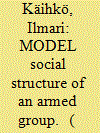

|
|
|
|
|
| Summary/Abstract |
This article investigates the Movement for Democracy in Liberia (MODEL) through a revised Weberian framework that focuses on legitimacy and offers a thick description of the different phases of this armed group. The article argues that the key to fostering cohesion is the harmonization of the micro, meso, and macro levels. This proved a difficult undertaking for the MODEL. Not only did the MODEL lack material resources but it also relied on different and evolving kinds of legitimacy on these levels. With its sources of legitimacy exhausted after the war, the MODEL ceased to exist.
|
|
|
|
|
|
|
|
|
|
|
|
|
|
|
|
| 5 |
ID:
159188
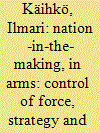

|
|
|
|
|
| Summary/Abstract |
At the core of waging war and strategy is the creation, control and use of force. This article investigates the volunteer battalions that mobilized in Ukraine during the spring of 2014. It contextualizes the volunteer phenomenon and focuses on the state strategies to establish control over these militias. As ambiguous entities arising from a situation characterized by rapid social change – revolution and war – the volunteer battalions threatened existing hierarchies and questioned state authority. The situation was exacerbated by the war, which deviated from the expectations of Ukrainian combatants and Western military observers alike. The state nevertheless enjoyed a modicum of success in reining in the militias through four strategies of undermining, co-option, incorporation and coercion. While predominantly integrated into a more rigid category of paramilitary forces, the volunteers continue to play a role in both the Ukrainian society and security sector to the unforeseeable future.
|
|
|
|
|
|
|
|
|
|
|
|
|
|
|
|
| 6 |
ID:
168598
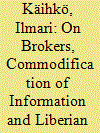

|
|
|
|
|
| Summary/Abstract |
This article investigates research brokers and commodification of information. When combined with inherently asymmetric research relationships and successful gatekeeping, brokers create demand and become indispensable. Potential negative effects of brokerage and commodification of information are discussed through experiences studying former combatants in Liberia. There bargains with brokers who could facilitate access to this hidden population resulted in a vicious circle as brokers confirmed what researchers wanted to hear. The attention to this issue was first brought by subsequent ethnography and participant observation, which also offer the promise of an ethically defensible way of collecting information.
|
|
|
|
|
|
|
|
|
|
|
|
|
|
|
|
| 7 |
ID:
183919
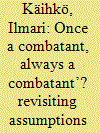

|
|
|
|
|
| Summary/Abstract |
Building on 15 months of ethnographic fieldwork, this article draws from military sociology to revisit past portrayals of Liberian former combatant networks and assesses four central assumptions connected to them: that formal wartime command structures continue as informal networks long after the end of the war; that former combatants are united by a wartime identity and form a community to an extent separated from the surrounding society; that wartime experiences have had a major disciplining effect on former combatants; and that former combatants are both good mobilisers and easy to mobilise in elections and armed conflict alike. Finding limited evidence close to two decades after the end of war to support these assumptions, I ultimately ask whether it would be more productive to both theory and Liberians alike to widen investigation from former combatants to structural issues that affect many more in the country.
|
|
|
|
|
|
|
|
|
|
|
|
|
|
|
|